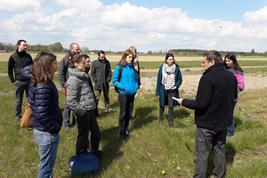
On April 27, 2017, PhD candidates of the theme cluster "Transformation Research" of the Heinrich Böll Foundation met with experts from ZALF e.V. in Müncheberg to discuss the role of agriculture in the transformation process towards a more sustainable society.
In their report “World in Transition – A Social Contract for Sustainability”, the Scientific Advisory Council on Global Change (WBGU, 2011) explains the reasons for an urgent transformation of the currently on fossil-fuels based economy into a climate and resource-friendly global economic order. According to this report, agriculture is one of three central transformation fields (beside urbanization and the energy sector) and is facing several challenges: on the one hand, it must meet the growing demand for food products and bioenergy; on the other hand, it is responsible for ca. 1/4 of all global greenhouse gas emissions that need to be reduced in order to reach the goal of a maximum global warming of 2°C established at the UN Climate Conference in Paris (COP 21).
The interdisciplinary cluster of the Heinrich Böll Foundation spoke with
Dr. Marcos Lana from the Institute for Land Use Systems about climate change impacts on agriculture in the state of Santa Catarina in Brazil and possible adaptation strategies.
Dr. Stefan Sieber and
Michelle Bonatti from the Institute of Socio-Economics gave an insight into the challenges faced by the rural population in Tanzania as well as possible innovative strategies to enhance food security. The PhD candidate
Martin Schmidt from the Institute of Landscape System Analysis reported on his experiences made within a project to improve the resilience of the semi-nomadic Afar people in Ethiopia. A local example for the role of agriculture in the transformation process was presented by
Maria Busse from the Institute for Socio-Economics, who deals with strategies to increase the acceptance of sustainability innovations among stakeholders in the biosphere reserve Spreewald. The program was completed by a guided tour on the field trials led by
Dr. Dietmar Barkusky, who spoke with the participants about opportunities for organic farming as well as alternatives to the use of chemical plant protection products. At the end of the day, the research group of the Heinrich Böll Foundation discussed the general conditions and possibilities for a more sustainable use of cropland and how agriculture can contribute to the mitigation of climate change.
